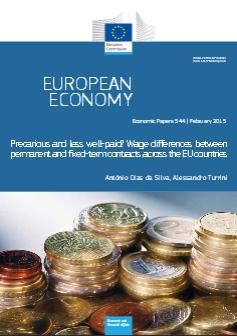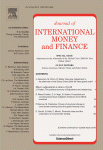Dias da Silva . Α. & Turrini, Α. (2015) “Precarious and less well-paid? Wage differences between permanent and fixed-term contracts across the EU countries“, European Commission: European Economy – Economic Papers, No. 544, Βρυξέλλες: Φεβρουάριος. This paper analyses the main features of the wage differences between permanent and fixed-term workers and what sources are driving these differences, including the role of labour market institutions. We analyse wage differences between …Read More
Estimating the impact of robots on productivity and employment
Michaels, G. & Graetz, G. (2015) “Estimating the impact of robots on productivity and employment“, VoxEU Organisation, 18 Μαρτίου. Robots may be dangerous not only to the action heroes of cinema, but also to the average manufacturing worker. This column analyses the effect robots have had in 14 industries across 17 developed countries from 1993 to 2007. Industrial robots increase labour productivity, total factor productivity, and wages. While they …Read More
A framework for banking structural reform
Vives, X. (2015) “A framework for banking structural reform, VoxEU Organisation, 17 Μαρτίου. The 2007–08 crisis revealed regulatory failures that had allowed the shadow banking system and systemic risk to grow unchecked. This column evaluates recent proposals to reform the banking industry. Although appropriate pricing of risk should make activity restrictions redundant, there may nevertheless be complementarities between these two approaches. Ring-fencing may make banking groups more easily resolvable …Read More
Eurozone rebalancing: Are we on the right track for growth? Insights from the CompNet micro-based data
Bartelsman, E., di Mauro, F. & Dorrucci, E. (2015) “Eurozone rebalancing: Are we on the right track for growth? Insights from the CompNet micro-based data“, VoxEU Organisation, 17 Μαρτίου. The shallow growth response to Eurozone rebalancing policies could point towards structural impediments. To uncover such impediments and design effective structural reforms, it is necessary to focus on the path from micro behaviour to macro outcomes. This column argues that …Read More
Does a surprise tightening of monetary policy expand shadow banking?
Nelson, Β., Pinter, G. & Theodoridis, K. (2015) “Does a surprise tightening of monetary policy expand shadow banking?“, VoxEU Organisation, 16 Μαρτίου. There has been an extensive debate over whether central banks should raise interest rates to ‘lean against’ the build-up of leverage in the financial system. This column reports on empirical evidence showing that, in contrast to the conventional view, surprise monetary contractions have tended to increase shadow …Read More
Is the ECB sacrificing reforms on the altar of inflation? – QE and its impact on structural reform efforts
Terzi, Α. (2015) “Is the ECB sacrificing reforms on the altar of inflation? – QE and its impact on structural reform efforts“, Bruegel Institute, 13 Μαρτίου. Roughly one month ago, Mario Draghi announced that the European Central Bank (ECB) would activate a large programme of sovereign bonds purchases (QE), in an effort to re-anchor euro area inflation expectations to the 2% target. In the run up to that decision …Read More
Confidence, aggregate demand, and the business cycle: A new framework
Angeletos, G. M., Collard, F. & Dellas, H. (2015) “Confidence, aggregate demand, and the business cycle: A new framework, VoxEU Organisation, 16 Μαρτίου. The Global Crisis has forced a revaluation of the standard macroeconomic models in use worldwide. This column discusses an enrichment that include a formal concept of ‘confidence’ about the short-medium term economic outlook – one that relates to market psychology rather than expectations about technology and …Read More
Is there an easy way out? Private marketable debt and its implications for a Eurozone break-up
Amiel, D. & Paul-Adrien, H. (2015) “Is there an easy way out? Private marketable debt and its implications for a Eurozone break-up“, VoxEU Organisation, 15 Μαρτίου. As the Eurozone crisis lingers on, euro exit is now being debated in ‘core’ as well as ‘periphery’ countries. This column examines the potential costs of euro exit, using France as an example. The authors estimate that 30% of private marketable debt would …Read More
For a few dollars more: Reserves and growth in times of crises
Matthieu Bussière, Μ., Cheng, G., Chinn, D. M. & Lisack, N. (2015) “For a few dollars more: Reserves and growth in times of crises“, Journal of International Money and Finance, Vol. 52, Απρίλιος 2015, σελ. 127–145. Highlights Countries with higher reserves saw a smaller growth shortfall in the great recession. Reserve to short-term debt is the most significant reserve adequacy ratio. Reserves’ marginal effect on growth is somewhat reinforced …Read More
Sovereign debt, bailouts and contagion in the Eurozone
Kobielarz, M., Uras, B. & Eijffinger, S. (2015) “Sovereign debt, bailouts and contagion in the Eurozone“, VoxEU Organisation, 12 Μαρτίου. The Eurozone Crisis has been characterised by a sharp rise in sovereign interest rates in peripheral countries. The re-emergence of spreads between peripheral and core Eurozone countries at the start of the Greek crisis came after a decade of homogeneous interest rates in the monetary union. This column investigates …Read More






